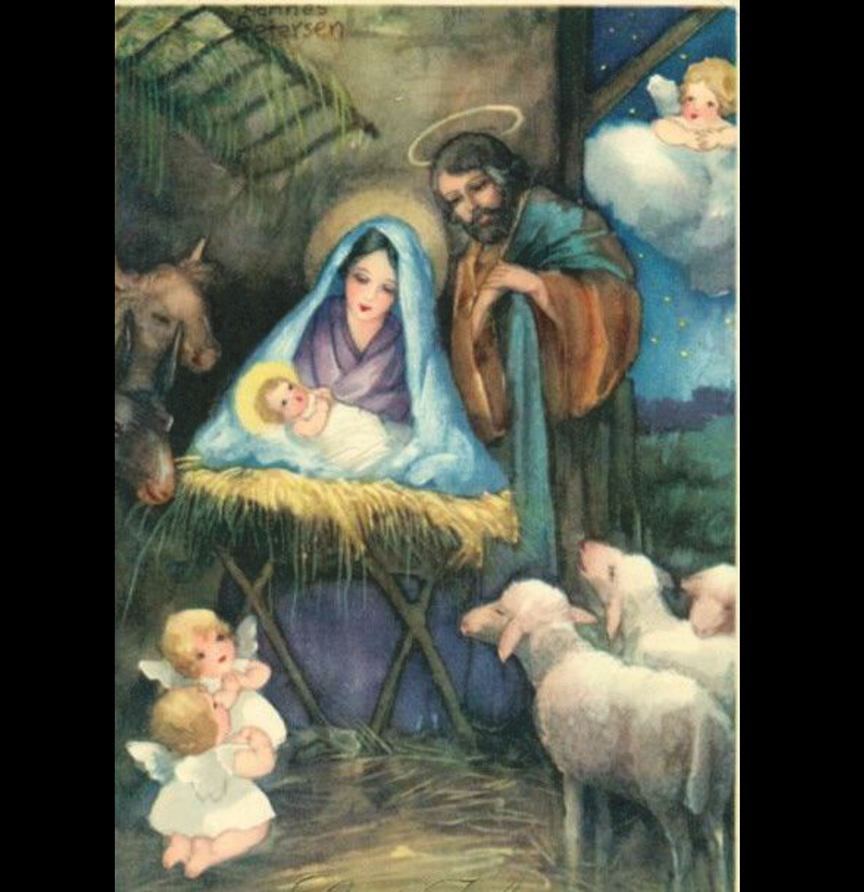Katherine’s Christmas Eve Vow – Part II

PHOTO: And it was then, on that Christmas Eve, as the country was recognizing the birth of Jesus Christ, that Katherine Pollock broke her silence about the mysterious man who had so recently been a guest in her home.


by Robert Hanaford Smith, Sr.
Weirs Times Contributing Writer
Let’s begin with a quick summary of last week’s article. <<CLICK TO READ PART I>>
Katherine Pollock was raised in an unidentified New England town in the mid-1800s. As a young lady she made a Christmas Eve vow to dedicate her life to helping others. As a result she cared for her parents until their death, and after spending three years as a saleslady in the city she dedicated the next four years of her life ministering to wounded and sick soldiers during the Civil War. After the war was over she returned to her New England home and went from house to house in her hometown helping needy people and came to be highly respected in the town. Things took a sudden change, however, when a shabbily dressed and sick man knocked on her door one day. She let the strange man stay in her house which the townspeople thought was scandalous and thus broke off their ties with Miss Pollock. There was much speculation as to who the man might be with suggestions that he might be a criminal or maybe a lover that Miss Pollock had kept secret.
The mysterious visitor had knocked on the door of Katherine’s house in August and weeks went by and he was still there. Neither Katherine or the Doctor who visited the home was talking about the man. Katherine was not invited to any homes in the town, nor were the people visiting her.
The loss of her good reputation was deeply felt by the woman who had dedicated her life to helping others, but through all the disgrace she was subject to she would not reveal the truth concerning her unidentified guest. She was keeping a promise but the appearance of evil that resulted was difficult for her to bear.
She became despondent at times to the point of despair. William Clough wrote: “besides all this she felt that possibly her unfortunate position had a tendency to weaken public morals, especially in the young, and this was no inconsiderable part of her burden.”
The curious neighbors realized that the man was sick, and the time came when they no longer saw him sitting on the back piazza (porch) on a sunny day. Sometime before Thanksgiving Day the undertaker and the minister were summoned to the Pollock homestead and soon afterwards the body of the deceased guest was removed from the house. A short service was held in the church for the still unidentified stranger and his body was buried in the soldiers lot in the local cemetery.

The guest in the Pollock house was gone , but that didn’t change the social status of Katherine Pollock who had in the past been the helper of many needy families in her home town. Now she was looked upon as one of low moral standing whom her neighbors no longer wanted as their friend.
After the death of the stranger Katherine experienced great loneliness and her own health began to fail. No word of any kind came from her brothers and sisters. Her neighbors weren’t neighborly. She spent Thanksgiving Day by herself, having had no invitation to observe the holiday with others.
But Katherine seemed to have an angel comforting her and she found pleasure in imagining that the house was active with family members, that is, her parents and her brothers and sisters.
After Thanksgiving Day she received no invitations from the families in the rural town and as the days and weeks went by her health continued to worsen. She spent her time meditating and reading Scripture and devotional material. “An unquestioning faith, an abiding trust, a calm and holy peace- such peace as the world can neither give nor take away- permeated the atmosphere of her humble home.”
Not everybody was blind to Katherine’s condition, however, and William Clough, who had been a native son of the unnamed town, received a letter from a concerned resident informing him of Katherine’s illness. He felt that he should call on his former acquaintance and made a late December trip back to the town, arriving there late in the afternoon of Christmas Eve.
A couple of hours later he was at the Pollack homestead, accompanied by two of the community’s ladies, who entered the house first and found Miss Pollock in bed. And it was then, on that Christmas Eve, as the country was recognizing the birth of Jesus Christ, that Katherine Pollock broke her silence about the mysterious man who had so recently been a guest in her home.
She first told her small audience about the voice from above that had spoken to her on a Christmas Eve over 25 years previously and asked her to give her life to helping others beginning with her own elderly parents. She said, “It cost me a severe struggle, but I gave up all. I said to the young man who had asked me to be his wife, that all was over between us. I did my duty as I understood it.”
She went on to tell of another Christmas Eve in 1861 when in a church the same voice told her to go to the fields of battle where her countrymen needed woman’s nursing and woman’s prayers, and how she obeyed. While ministering to needy soldiers during the war she once again met the man who years previously had asked her to be his wife. He was then a Colonel who was leading victorious battalions during that war between the States.
After the conflict was over the still unidentified man asked her once again to marry him.
She was weary from her efforts in the war and in poor health. Feeling that it would be wrong for her to accept his proposal because in her weakened condition she felt herself an invalid, she again turned him down. She did tell him, however, that if he was ever in want or sick and needed someone to care for him and give him a home she would do so, not expecting that time to ever come. So when the Colonel appeared at her door as a poor, homeless, and sick man she couldn’t turn him away. She said, “All he desired was food, a little of woman’s nursing, and a bed upon which to die in peace.”
Katherine wouldn’t reveal the name of the man because he had made her promise not to do so, feeling that his name and the place he made in history would be disgraced if it were known that he died a poor man.
Katherine Pollock then spoke of the damage done to her own reputation because of once again putting the needs of another above her own. She spoke of the inner peace that she experienced and the satisfaction of being obedient to the Divine calling.
After telling her visitors: “I forgive all who have wronged me in word or thought,” Katherine made the transition from the mortal to immortality on that Christmas Eve as others celebrated the birth of a baby who was named Jesus Who came to save people from their sins.
Faithful unto death that leads to life.
Robert Hanaford Smith, Sr., welcomes your comments at danahillsmiths@yahoo.com



